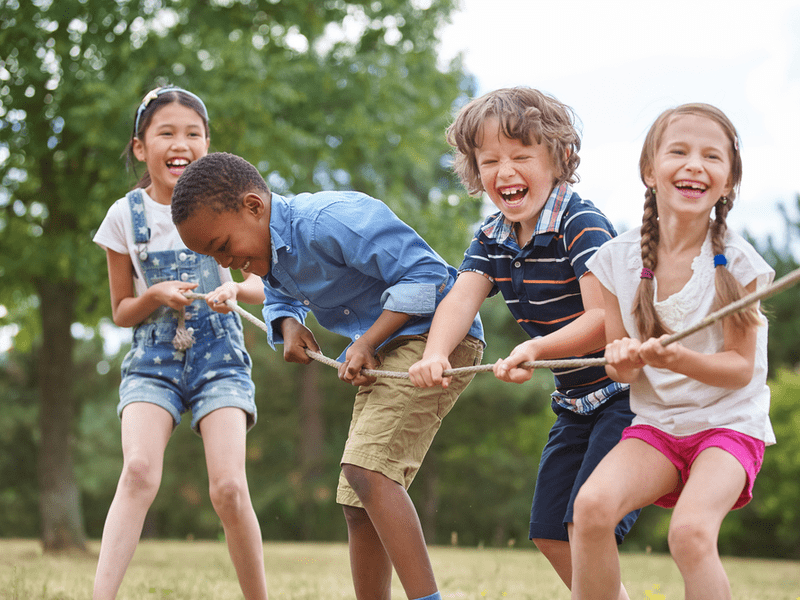
Social skills may affect your child’s school performance, medical needs—and even their IQ! That being the case, it’s critical to ensure that your children develop strong social skills early on in life. However, knowing which skills to prioritize isn’t always easy. How can you tell the difference between healthy socializing and behaviour that could establish negative habits?
Don’t worry—we’re here to help you recognize 10 of the most valuable social skills your children can learn and show you how to start developing them as soon as possible. With our help, you’ll find it easier than ever to help prepare your child for social success.
What’s the Link Between Socialization and Academic Achievement?
Many parents consider socialization a potential distraction from “more important” tasks, such as chores and studying. However, a growing body of research suggests that socialization actually promotes productivity and learning.
One recent study found that focusing on social and emotional development for elementary school children positively impacted their test scores. The methods used in the study were intended to show the children how to create positive relationships. Forming these relationships helped students co-operate in the classroom, making it easier for them to learn and perform tasks.
What Social Skills Are Most Important?
We encourage parents to prioritize the following social skills for their children:
Listening
Listening helps a child develop learning, understanding, and mental skills. Children who are strong listeners may be better prepared to solve problems than those who are not. Children’s literature is an excellent tool for helping your child improve their listening skills. Reading your child poems, fables, and fairytales with rich images are all excellent strategies.
Following Directions
Learning how to understand and follow directions prepares children for success in school (and later, in the workforce). The Responsive Classroom method encourages adults to help children learn to follow directions by using a simple process:
- Work with children to set goals
- Connect the goals to rules
- Connect the rules to behaviours
- Use the behaviours to make rules come alive
Using Manners
Teaching children to be considerate of others can help them prevent and resolve conflicts as they grow older. One of the easiest ways to help your child develop appropriate manners is to model behaviour for them. Remember, children typically follow the examples set by their parents, teachers, and other adults.
Learning Body Language
Language is one of the best tools we have for expressing ourselves, but that doesn’t always mean using words. Over half of all communication is commonly said to be non-verbal (although this varies according to each given situation).
Regardless, it’s vital to teach your children how to recognize physical cues in others. One great idea is to play games like Body Language Charades, where you write different emotions on index cards and take turns acting them out with your child while the other person tries to guess them.
Having Patience
Patience allows your child to control their emotions and responses to challenging situations. These abilities can often lead to better outcomes for the child.
Take the now-famous example of Walter Mischel’s Marshmallow Test in the 1960s, where children were left alone in a room with a marshmallow and told they could have another marshmallow if they went five minutes without eating the first one. Children who perform well on such “delayed-gratification” tests tend to perform better at school and work, have healthier relationships, and even suffer from fewer health problems when they get older.
Good Sportsmanship
Success at a game or task can help your child develop confidence, but winning isn’t everything. The ability to lose gracefully can be even more important, since—as the old saying goes—life is full of disappointments. The sooner your children learn to accept the occasional defeat with grace and dignity, the better prepared they’ll be for the real world. Giving your child credit for trying and modeling good behaviour when they beat you at something are both great ways to teach this vital skill.
Having a Positive Attitude
Positivity improves children’s memories, boosts their problem-solving skills, and even makes them better at math—that’s what research from Stanford University says, anyway. Using positive reinforcement and creating opportunities for children to help with tasks can be effective ways to improve their attitudes. Just remember that pretending to be positive all the time isn’t necessarily healthy (make sure your children feel supported when they need to talk about challenging feelings, too!).
Empathy & Self-Awareness
As your children get older, the rules of their social environments become increasingly complex. Helping them connect to their feelings and the feelings of others prepares them to navigate these environments successfully. Once your child has learned the basics of good manners, begin to teach them about boundaries—and encourage them to set their own boundaries, too.
Developing (Real) Confidence
We all take for granted that confidence is critical for success but teaching a child to be confident isn’t easy. Moreover, some parents create insecurity in their children by teaching them to project confidence, which causes them to monitor and judge themselves continually.
New research suggests that the best way to inspire confidence in your kids is to help them focus on themselves less. Encouraging your child to be present, mindful, and connected to others can decrease their stress levels and improve their cognitive performance.
Working with Others
The skills listed above are vital, but your child needs to practice them outside the home to become truly comfortable with them. Research shows that access to high-quality child care, such as licensed daycares and preschools, can improve both emotional and cognitive development. Consider enrolling your child in a program that will allow them to start practicing these skills as soon as possible.
Take a Proactive Approach to Your Child’s Social Development
Social skills give your child valuable tools for fulfilling their goals and overcoming obstacles. Use the information above to start teaching your child essential social skills today so that they can enjoy a brighter tomorrow.


